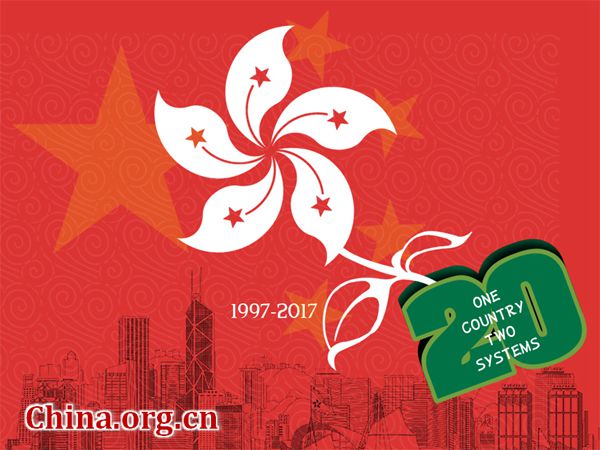Triumphal progress marked on 20th anniversary of HK's return to China
- By Tim Collard
 0 Comment(s)
0 Comment(s) Print
Print E-mail China.org.cn, June 30, 2017
E-mail China.org.cn, June 30, 2017

On the forthcoming 20th anniversary of China's resumption of sovereignty over Hong Kong (July 1), I won't beat the drum for British colonialism; however, once Britain came to realize the colonial era was over, it can boast a comparatively good record in managing the process of decolonization.
It did not simply abandon colonies to chaos, as one or two other European countries did; every effort was made for a peaceful transition.
The transition of sovereignty in 1997 was an excellent example. Obviously, the British cannot claim all the credit: It was a joint enterprise between the governments of Britain and China and the people of Hong Kong.
During my time in the U.K. Diplomatic Service, there are two episodes of which I am particularly proud; first, my involvement as head of the Foreign Office's South Africa section in the transition of that country to a multi-racial democracy, and then, a few years later, my involvement, from the British Embassy in Beijing, with the successful transfer of sovereignty over Hong Kong.
On the night of June 30, 1997, I was a medium-level diplomat based in Beijing. All my superiors were in Hong Kong attending the celebrations, and a colleague and I were tasked with monitoring what was happening in the Chinese capital.
He chose to report on the television coverage of the official celebrations, while my job was to go out on the streets and observe the reactions of ordinary Chinese people. There were street parties all over Beijing, and I simply joined in. I freely admitted that I was British, and wanted to celebrate jointly with the people of China.
Not once did anyone show any hostility towards me, and I was able to say, in my report to London next morning, that the attitude of the Chinese people on the streets could best be expressed by saying I was not allowed to buy my own drinks all evening. We were friends: We had managed a great enterprise together.
I have always loved Hong Kong, where I studied Putonghua before beginning my career as a diplomat in China. My younger son was born there, and I maintain friendships and return frequently. Everyone asks me if I have noticed many changes. Well, of course, as in any modern city, there have been developments, but less has changed than in the great mainland cities, due to the rapid development of the economy.
The biggest change in Hong Kong is that, when my son was born in 1989, nobody spoke Putonghua. (Trying to guide the Cantonese monoglot ambulance driver to the hospital with my wife in labour was a nightmare!).
Now, Hong Kong is fully integrated with the economy and society of the mainland, while retaining all its long-established character, thanks to the "one country, two systems" principle enjoying twenty years of success.
Hong Kong's "capitalist" system combines a low-tax, low-intervention government with an emphasis on the importance of social cohesion. The late Deng Xiaoping, when pioneering his reform and opening policy in the parts of Guangdong Province closest to Hong Kong, recognized that these two elements were a potential basis for China-wide growth, and they were seamlessly incorporated in the new Hong Kong after the transfer of sovereignty.
And the new HKSAR government also addressed its primary task of providing security and enforcing the rule of law, without the least bit of social turmoil spoiling the harmony of the transition.That has basically continued ever since.
Deng's visionary policy of "one country, two systems" remains unique in the history of our world so far. Along with the Basic Law, the result of widespread consultations between influential bodies in both Hong Kong and the mainland, this policy has maintained Hong Kong's economic success, which brings an enormous contribution to the Chinese nation, and Hong Kong's traditional culture, which enriches the whole world.
Hong Kong, under Chinese sovereignty, regularly maintains its position as the world's freest economic entity, and the territory also enjoys an international reputation as one of the world's least corrupt economies, indeed a vital attraction for any investor.
As a British observer and commentator, I have obviously followed this process from a British perspective. But the British can never really claim to have done the work of creating Hong Kong. This achievement is due to the hard work and dedicated commitment of the Chinese people.
Hong Kong's citizens have earned their current prosperity, and must be delighted to see the commitment shown by the central government to ensuring stability, especially during a very turbulent period of the Asian financial crisis that erupted in the very week of the 1997 handover; indeed, there have been other severe global crises since.
However, the HKSAR, with its ground-breaking symbiotic relationship with the mainland and the national government, goes from strength to strength.
Tim Collard is a columnist with China.org.cn. For more information please visit:
http://www.china.org.cn/opinion/timcollard.htm
Opinion articles reflect the views of their authors, not necessarily those of China.org.cn.






Go to Forum >>0 Comment(s)